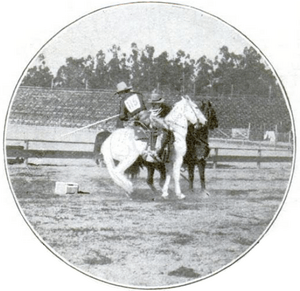Potato race facts for kids
A potato race is one of several similar racing events where contestants compete to collect a number of potatoes as quickly as possible. Participants may run on foot or be mounted on horseback, depending on the style of race. It is not clear precisely when or where the potato race originated. Potato races of both types were most popular in Australia, England, Scotland, the United States of America and Wales. Potato races were commonly held at community events such as county fairs, rodeos, picnics, and track and field meets from at least the middle of the 19th century until approximately the 1930s.
Potato races run on foot were generally considered events for children, and were often held in schools as playground games or part of physical education, or at local events such as fairs.
Mounted events were particularly prevalent in the Southwestern United States. Individual mounted events usually consisted of individuals competing to be the fastest at collecting potatoes along a structured course. Team-based events had no defined course, and were notable for their violence. Players were permitted almost every possible tactic for interfering with the opposing team, including dragging other riders off their horses.
Potato races, both on-foot and mounted, are occasionally still held at local gatherings or riding competitions today, although the violent mounted version has died out.
Foot races
Potato races run on foot were commonly held for children as playground games and during physical education classes in schools. They were also featured at local events such as picnics or fairs, and still occasionally are today. Potato races have also been used by researchers to measure physical performance in children.
A number of lanes, one per runner, would be marked out. Potatoes would be placed at intervals along each lane, and a basket would be placed several feet behind the lane. Runners would race to retrieve potatoes one by one, returning each one to the basket before returning for the next. The winner was the first to collect all the potatoes in their lane. In one variation, two runners competed to be the first to return fifty potatoes to their own basket, racing simultaneously to take the closest potato from a single line of one hundred potatoes rather than separate lanes.
On-foot potato races have been likened to the Zuni game of A-we-wō-po-pa-ne, which involved collecting stones rather than potatoes.
Writing in 1915, feminist theorist Charlotte Perkins Gilman described seeing a moving picture of a potato race on ice, and remarked on the notable difference between the performance of men and women, which she attributed to the restrictive clothing worn by women at the time.
Mounted
Individual competition
Potato races with mounted participants were historically geared toward adult participation. They were prominent in the Southwestern United States. In mounted races, competitors used sharpened stakes to spear potatoes and bring them from one end of a course to another. These races were timed, and the racer whose basket was heaviest at the end was the winner. One less common variation bore some similarities to the blood sport of rooster pulling, but used potatoes rather than partially-buried roosters. A line of potatoes was spaced out along a course, and a rider would ride by at a loping pace, leaning down from their horse and snatching the potatoes from the ground. Riders who failed to maintain speed, or missed a potato, would be disqualified. The fastest remaining rider was the winner.
Mounted potato races have been staged with participants riding on vehicles rather than horses. The British Almanac of 1897 mentions a bicycle-mounted potato race in an article describing bicycle gymkhana. A large picnic in Radford, England, in 1908 featured a bicycle potato race whose riders were young women. It was described at the time as a "splendid exhibition". In 1910, 5,000 spectators at the Indianapolis Motor Speedway watched a sort of reverse potato race where passengers in cars tried to throw potatoes from the vehicle into baskets placed along a track. American Motorcyclist magazine reported that the First Annual Motorcycle Rodeo, held in 1970, featured a potato race with riders mounted on motorcycles.
Team-based tournament
Swinging their laths like swords and crashing into one another, potato racers at Cassoday left the hundred-yard course strewn with potatoes and an occasional horseman as spirits, and tempers, rose.
—Jim Hoy, Plains Folk: A Commonplace of the Great Plains, p. 126
Around the turn of the 20th century some mounted potato races were run as competitions between teams attempting to fill a basket with potatoes. These events were not so much ordered races as they were free-for-alls, which could last as long as ten minutes. They were notably chaotic, as riders were not confined to lanes, and the rules permitted competitors to use their stakes to knock potatoes off the stakes of the other teams. Physical violence often ensued; the autobiography of cowboy Harry Arthur Gant describes one team race at a Frontier Days event in 1909 that became so violent that the judges were forced to halt the competition in the middle. The Courier-Journal noted that violent tactics such as pulling riders off their horses were considered acceptable, and that "biting is about the only thing that is barred."
Writing in Plains Folk, James Hoy remarked upon the similarity of these races to the Central Asian sport of buzkashi, which also involves fiercely competitive riders attempting to bring items to a goal, albeit on a much larger scale than potato races.
Images for kids
-
Boys running a potato race in Ridgway, Colorado during a Labour Day celebration in 1940.
 | Laphonza Butler |
 | Daisy Bates |
 | Elizabeth Piper Ensley |





